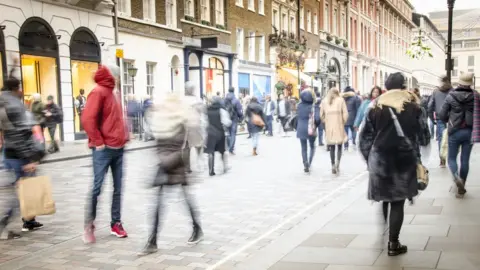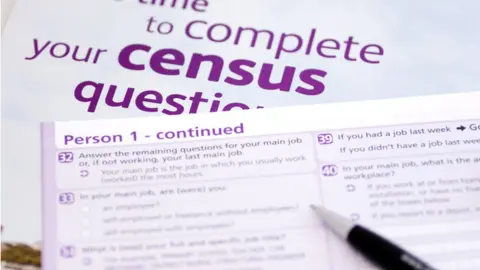What is a census and do I need to complete it?
 Getty Images
Getty ImagesPeople are being asked to fill in their census as soon as possible.
The once-a-decade Census day took place on Sunday 21 March 2021.
The survey aims to provide a snapshot of life in England, Wales and Northern Ireland, which can be used by organisations to help make sure they provide the right services for people.
What is a census?
A census is a count of all people and households in an area.
Censuses have been conducted since ancient times, to assess the size of a population and calculate what they need. The first UK census was in 1801.
On one day every 10 years, households are asked to fill in a questionnaire about every person living at the property, including their age, race, occupation and relationship status.
 Getty Images
Getty ImagesThe information gathered provides a snapshot of the population, including its size and the age of people.
This is used by charities and services like hospitals, schools, universities and job centres to plan and fund services including transport, education and healthcare.
When do I need to complete the census by?
Census day this year was on Sunday 21 March for households in England, Wales and Northern Ireland.
People who haven't filled it in by that date are being asked to do so as soon as possible.
The Scotland census will now be in March 2022. Coronavirus restrictions mean preparations haven't taken place, the National Records of Scotland said.
Do I have to complete the census?
By law, you must complete or be accounted for in the census.
You can be fined up to £1,000 if you do not fill it in, or give false information.
You do not have to answer the questions marked as voluntary.
People staying in the UK for under three months do not have to fill out a census, but everyone else should be covered by one - including students and those who have gone abroad for under a year.
Will census officers come to your house?
In late March and early April, census field officers may visit your household if you haven't submitted a form.
They will encourage you to complete it and show you how to get further help if needed.
The field officers will be wearing PPE and won't need to enter your house.
 Getty Images
Getty ImagesWhat do I have to do?
Every householder must either answer the questions for everyone living there, or make sure each person answers their own.
This year, people are being asked to fill the census out online using an access code sent in the post.
You can do this on a computer, mobile phone or tablet and should submit the survey on Sunday 21 March, or as soon as possible afterwards.
You can also request a paper version online, or over the phone.
What's different about the census this year?
For the first time, there will be voluntary questions on gender identity and on sexual orientation for over-16s.
In the UK, there are no official figures for those who identify their gender as different from the sex registered at birth. Gathering this information will help develop policy, provide services and improve equality, the ONS says.
However, the question "What is your sex?" has proved controversial. The ONS had to change its guidance after campaigners argued it was "unlawful" people were told they could use the sex recorded on their passport, as this can be changed without a legal process.
 Getty Images
Getty ImagesThe High Court ruled online guidance - not in the paper versions of the census - must make it clear the question can only be answered by reference to a birth certificate or gender recognition certificate, which allows trans people to change their legal gender.
Prof Sir Ian Diamond, the UK's National Statistician, has suggested the 2021 census could be the last one, as he is looking into cheaper and more up-to-date alternatives.
His team will work out whether accurate information could be obtained from other sources such as the Ordnance Survey, GP lists, council tax records and driving licence details.
Combined with regular, large-scale population surveys, this could provide better and more detailed information in a cheaper and more timely way, he says. No decisions have yet been taken.
 Getty Images
Getty ImagesWhen will the 1921 census be released?
While information gathered in censuses is anonymised for service providers to use, the full census isn't made available to the public for 100 years.
Lots of people are keen to read the 1921 census to learn more about their family history.
But that won't be published until early 2022, according to the National Archives.

- LOCKDOWN LOOK-UP: The rules in your area
- SOCIAL DISTANCING: What are the rules now?
- SUPPORT BUBBLES: What are they and who can be in yours?
- FACE MASKS: When do I need to wear one?
- TESTING: How do I get a virus test?

